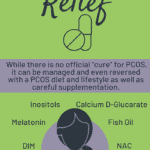10+ Supplements for PCOS Weight Loss
From unwanted hair growth to weight gain to irregular cycles, there are many annoying symptoms that can occur with polycystic ovary syndrome. This article includes ten supplements to help manage PCOS with an emphasis on weight loss.

PCOS Symptoms
PCOS, or polycystic ovary syndrome (also known as polycystic ovarian syndrome), is a hormonal imbalance typically characterized by cysts on the ovaries, incomplete or unsuccessful ovulation, and excess male hormones in women.
Some of the most annoying symptoms that can occur with PCOS include:
- unwanted hair growth
- hair loss
- weight gain
- weight loss resistance
- sleep problems
- gut issues
- irregular menstrual cycle (irregular periods)
- acne
While there is no official “cure” for PCOS, many health practitioners believe it can be managed with a PCOS diet and targeted supplementation.
The best PCOS supplements help manage insulin resistance by increasing insulin sensitivity, improve detoxification efforts, and encourage normal ovulation and balanced hormone levels.
Along with managing symptoms through diet and dietary supplements, it is thought that women with PCOS can also experience improvement by eating a real food diet with lots of fiber, getting good quality sleep, and managing stress.
All of these lifestyle changes can help with PCOS and weight loss, making it easier to reach and maintain a healthy weight.
You may also wish to read my article on the signs of estrogen dominance which may mimic the symptoms of PCOS.
PCOS Supplements for Weight Loss
You can get a lot of what you need in terms of nutrients with a well balanced real food diet that is low in processed foods and sugars. See my favorite Instant Pot recipes that can help with weight loss.
But, most practitioners agree that supplements may be necessary as it can be hard to reach the levels needs of some nutrients just from your diet. There are also some targeted herbs that can help promote healthy fat loss.
This list includes ten of the best supplements for PCOS to help manage symptoms and weight loss.
As always, you should check with your healthcare provider first to make sure these are right for you.
You can also try PCOS tea to help manage symptoms.
1. Inositols
Often, women with PCOS also have insulin resistance as a result of abnormal insulin function.
As a result, there can be a long list of annoying symptoms that can occur, including irregular cycles, weight gain, unwanted hair growth, weight loss resistance, and more.
Inositol is a type of sugar that has effects on the insulin response in the body, among other processes. Both myo-inositol and d-chiro-inositol have been studied to help women with PCOS to help manage their insulin response and to help decrease fasting blood glucose.
In women with PCOS, supplementation with d-chiro-inositol was found to regulate insulin levels, drastically reduce androgen levels in the blood, and even reduce elevated blood pressure and triglycerides.
While more research is needed, it is thought that supplementing with inositol may help decrease weight gain, decrease unwanted hair growth, and improve cycle regularity in women with PCOS.
You may also wish to avoid alcohol to help manage insulin resistance in PCOS.
2. Melatonin
While melatonin can help improve sleep quality, it has also been found to help with fertility by improving follicle development in women with PCOS.
It is also thought that melatonin supplements can manage tummy fat and weight gain, some of the most annoying symptoms of PCOS.
A bonus of melatonin supplementation is that it can help with sleep. Adequate sleep is important for women with PCOS or any kind of hormonal imbalance, as it allows the body to rest, restore, and detoxify.
3. Fish Oil
Fish oil, when sourced sustainably from wild-caught coldwater fish, is an excellent source of omega-3 fatty acids.
A balanced ratio of omega-3 fatty acids to omega-6 fatty acids is crucial, as having adequate omega-3s reduces inflammation in the body and contributes to healthy hormone function.
Omega-3 supplementation is recommended for women with PCOS because it can reduce excessive testosterone levels and lower inflammation which is another key component of PCOS.
Fish oil supplements, eating more fatty fish, or omega-3 supplements may help with several of the most annoying symptoms of PCOS, including hirsutism (unwanted hair growth) and inflammation. Once inflammation is under control, natural and easy weight loss should occur.
4. Chromium Picolinate
Chromium is an essential mineral that can only be obtained through diet or supplementation. One of its roles in the body is to help insulin perform its duties, which is why this supplement can be especially helpful for women with insulin-resistant PCOS.
Chromium picolinate, which is simply the best-absorbed form of supplemental chromium, has been found to reduce insulin resistance and stimulate ovulation in women with PCOS.
5. Cinnamon
Cinnamon not only tastes great, but it’s also a master at balancing blood sugar levels.
You can start adding ground cinnamon to more of your meals, but you might need to also consider a cinnamon-based supplement to get enough of it to make a difference.
Once you get your blood sugar levels under control, then it should be easier to manage your weight and energy levels. This can be especially important for women with PCOS who tend toward insulin resistance or metabolic syndrome.
6. DIM
DIM, or diindolylmethane, is a supplement with concentrated forms of the phytochemicals present in cruciferous vegetables such as broccoli, kale, and cauliflower. Cruciferous veggies are amazing for overall health, but they’re especially helpful for helping the body get rid of excess sex hormones.
DIM can be used to help reduce the annoying symptoms of estrogen dominance, or excess levels of estrogen. DIM can help women with PCOS process and eliminate excess estrogen to resolve hormonal imbalances.
Read more about how to reverse estrogen dominance naturally.
7. Vitex
Vitex, also known as Chasteberry, is an herbal supplement that can help regulate menstrual cycles. Research has found Vitex supplementation to be helpful in regulating irregular menstrual cycles and improving fertility in women with PCOS.
Keep in mind, though, that Vitex raises progesterone by raising LH (luteinizing hormone) levels. If LH levels are already high, as they are in some women with PCOS, you should avoid Vitex. Your doctor can help make sure that your LH levels don’t get too high with a blood test.
While Vitex supplementation may not be directly linked to weight loss, it may indirectly help women with PCOS manage their weight by having positive effects on hormone balance.
8. NAC
NAC, or N-acetyl-cysteine, is the supplement version of cysteine, which is a precursor amino acid to the antioxidant glutathione.
NAC has been shown to improve fertility and ovulation rates in women with PCOS. NAC achieves this by reducing circulating insulin, thus reducing testosterone levels, and by reducing the damage done to the ovaries by free radicals.
In these ways, NAC may help reduce body weight.
9. Calcium D-glucarate
Calcium D-glucarate is a supplement that can support your liver’s detoxification, regulate estrogen metabolism, and lower lipid levels. All three of these applications are helpful for women with PCOS and may aid in healthy weight management.
Additional calcium D-glucarate may help reduce cardiovascular disease or heart disease by reducing high cholesterol levels.
10. Probiotics
Probiotics can be found in certain foods, but women with PCOS should also consider a quality probiotic supplement.
We know that the health of the gut microbiome affects countless other processes in the body, so ensuring that the gut has an optimal balance of good bacteria to bad bacteria is important for overall health.
One way to populate the gut with good bacteria is through probiotic supplementation or eating foods with natural probiotics.
Research found that women with PCOS often have some type of gut dysbiosis or simply a less diverse gut microbiome, which affects lipid levels, androgen levels, and insulin levels. Another factor of gut health in PCOS treatment is the inflammation that an unhealthy gut can cause.
Since PCOS can be partially attributed to chronic low-level inflammation, a healthy gut is crucial in managing PCOS. Supplementing with probiotics can improve and diversify gut flora, therefore improving symptoms of PCOS including unwanted weight gain.
See my related article on the best dairy-free probiotics.
Bonus Recommendations
There are quite a few other nutritional supplements and herbs that may benefit PCOS women who have high insulin levels or metabolic disorder.
Vitamin D supplementation is likely necessary, but you won’t know unless you get a blood test (see how to order a lab test without a doctor).
Other options to consider include:
- Berberine
- Green tea
- Spearmint tea
- Zinc
- Saw Palmetto
- Licorice Root
- Evening Primrose Oil
- Ashwagandha (read my full article on ashwagandha benefits for PCOS)
FAQs About PCOS Weight Loss
Women with PCOS often have insulin resistance, which means their bodies don’t use insulin effectively. This can lead to increased insulin levels, which may promote fat storage and make it harder to lose weight. Additionally, hormonal imbalances associated with PCOS can disrupt metabolism and appetite regulation.
While supplements can support weight loss efforts in women with PCOS, they aren’t a magic solution. A combination of a balanced diet, regular exercise, managing insulin resistance, and possibly medication is essential. Supplements should be viewed as an additional treatment that goes along with diet and exercise.
es, like all treatments, supplements can have side effects. For example, high doses of inositol can cause gastrointestinal upset in some individuals. It’s essential to consult with a healthcare provider before starting any new supplement.
The time can vary widely based on individual factors, including diet, exercise habits, and the degree of insulin resistance. Some might see results in a few weeks, while others may take months. It’s essential to have realistic expectations and understand that weight loss with PCOS can be a slower process.
Some supplements can potentially interfere with medications or worsen insulin resistance. For example, excessive biotin might skew thyroid test results. Always consult with a healthcare professional before introducing a new supplement.
Conclusions
There are many annoying symptoms associated with PCOS, including unwanted hair growth, gut problems, weight issues, and more. This article includes the best supplements and herbs that may help manage PCOS and even help get it under control.
Additional Weight Loss Resources You Might Like
Don’t forget to join my newsletter list to get exclusive clean eating recipes and tips. The newsletter is 100% free with no spam; unsubscribe anytime.
About the Author: Carrie Forrest has a master’s degree in public health with a specialty in nutrition and is a certified holistic nutritionist. She is a top wellness and food blogger with over 5 million annual visitors to her site. Carrie has an incredible story of recovery from chronic illness and is passionate about helping other women transform their health. Send her a message through her contact form.
Note: this post is for informational purposes only and is not intended as medical advice. Please consult your healthcare provider for recommendations related to your individual situation.






















I have had P.C.O.S. since I was 19. I never had any help for it. I suffer from thinning hair and lots of other symptoms. Can anything help to regulate my hormones? I really want some help please.
I would check out the book, The Period Repair Manual by Lara Briden as a great place to start.
Unfortunately, my 25 year old step-daughter has this, but it’s nice to know that there are so many supplements that can help. I will definitely tell her about this article!
I was diagnosed with PCOS when I was 14, so I know the struggle. I’m going to have to try some of these.